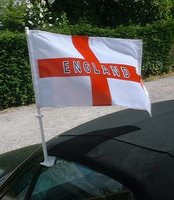My take on relocating from the UK to the USA -- Pros and Cons, Dos and Don'ts, Loves and Hates. Why "The Americanization of Emily"? -- It's the title of a 1964 film starring Julie Andrews (IMDb) and Emily is the name of my eldest daughter. (Email: violagoodacre-at-gmail-dot-com)
Friday, June 30, 2006
Wimbledon
Once every four years, Wimbledon has to take second place to the World Cup. Britains' best hope, Tim Henman is already out of the competition due to having had to face Federer in the second round. Our new best hope for this year is Andy Murray. Greg Rusedski lost in the first round. Although we're happy to latch onto what's available, it's been a long time since Britain has seen a real home-grown tennis hero or heroine. These days, and for a considerable number of years, the game has been dominated by the USA (even though in this neck of the woods they only seem to concern themselves with basketball and ice hockey).
The Quarter Finals
Argentina-Germany
We thought that Germany were gonners when Argentina scored and Germany seemed to be unable to get their act together, but then a cracking goal in the eightieth minute made both teams up their game. It still went to penalties, where Argentina missed their second shot. It was all over for Argentina with the saving of their fourth shot. The final score was 1-1 a.e.t. and 2-4 in the penalty shoot out.Italy-Ukraine
Italy whitewashed Ukraine 3-nil. This means that Germany and Italy will be playing each other in the semi-finals.England-Portugal
Surprise, surprise -- England go out on penalties. At least this means that the universe is not about to implode.The match itself was end to end stuff even when we were down to ten men after Rooney was sent off. The main annoying thing about the match was the way that the Portugal players kept taking dives at every opportunity. It's poor sportsmanship.
Everyone knows that England will always lose on penalties, so our only chance would have been to get one in during the ninety minutes or during extra time. As soon as it got to penalties, our defeat was pretty much a fait accompli. Our hopes were raised, nevertheless, when Portugal missed a few penalties themselves, but unfortunately we proved worse at penalty taking than they did.
We would have probably gone out (probably to penalties and probably to Brazil) in the next round anyway, but it would have been nicer to go out in the semi-finals rather than the quarters.
By the way, did anyone see the Peterborough (my home town) banner right behind one of the goals?
Brazil-France
Despite not playing that well in the group stages, France managed to raise their game to beat the current champions (France 1, Brazil 0). Perhaps, as the current champions have been knocked out in the quarter finals, we can feel less bad about it happening to us especially as we put up quite a good fight. Portugal and France will be head to head in the semi-finals. The final will probably be France vs. Germany.Here's my wallchart.
The Mothman Cometh?
 Forty years after the unexplained incidents in West Virginia, the infamous Mothman was spotted terrorising the Goodacre family in North Carolina. This beauty was having a rest on our back door. It had a body length of at least two inches. I've never seen a moth this big before. I was half inclined to go outside and photograph its back, but was worried that if I open the door it might fly into the house. It's one thing if the cats eat the odd small bug, but I didn't really want them to have a go at this one.
Forty years after the unexplained incidents in West Virginia, the infamous Mothman was spotted terrorising the Goodacre family in North Carolina. This beauty was having a rest on our back door. It had a body length of at least two inches. I've never seen a moth this big before. I was half inclined to go outside and photograph its back, but was worried that if I open the door it might fly into the house. It's one thing if the cats eat the odd small bug, but I didn't really want them to have a go at this one. A quick google search later told me that it was a Royal Walnut Moth (Citheronia regalis (Fabricius)). Apparently, this species can have a wingspan of over 15cm. I took this second photo to give you some perspective on the size of this moth.
A quick google search later told me that it was a Royal Walnut Moth (Citheronia regalis (Fabricius)). Apparently, this species can have a wingspan of over 15cm. I took this second photo to give you some perspective on the size of this moth.
Thursday, June 29, 2006
Fame at Last
At last, I have my 15 minutes (probably more like 15 seconds) of fame for I have been mentioned in Duke University's online magazine, Duke Today, in an article entitled World Cup Fever that is all about how Duke students and staff are getting into the World Cup.
Sunday, June 25, 2006
England Through to Quarter Final
Come On England!!!!
Not a stunning performance from England, but Beckham's free kick was enough to get the job done (even though he was visibly suffering from heat exhaustion). Good ol' Becks. The final score was England 1, Ecuador nil. (By the way, if I could have a dollar for every time the ESPN commentators say "Bend it like Beckham" during an England match, I'd be rich.)
Germany have already beaten Sweden (2,0) and Argentina have beaten Mexico(2,1), so Germany and Argentina will be meeting each other in the quarter finals.
Update: Holland-Portugal
One-nil to Portugal, so we'll be playing Portugal in the quarter final. We lost to Portugal in the quarter finals of Euro 2004. Lets hope that this time we can get our own back.The match itself was characterised by out and out fighting. The referee seemed to have totally lost control at one stage. There was a whopping six minutes of stoppage time at the end of the ninety minutes. By the end, both teams were down to nine men and twelve of the remaining players had yellow cards.
The good news (for England) is that Portugal will be playing us in the quarter final with two men suspended and seven on yellow cards.
Update: Australia-Italy
Italy managed to win in extra time with a perfect penalty (1:0), but in my opinion a penalty should not have been given. I was neutral in this match (although I do like to support the underdog, so was sort-of supporting Australia). I wouldn't have minded whoever got through, but it's always sad to see someone go through on an unjust penalty.Update: Switzerland-Ukraine
Ukraine are through after a penalty shoot out, so will be playing Italy in the quarter final.Update: Brazil-Ghana
I didn't watch this match because I'd promised that I'd take the kids to see Just My Luck at the cinema. The weather has been bad lately and they've been going spare being in the house all the time. The score (3-0 to Brazil) tells me that the match was pretty much the expected slaughter. Ren'll be pleased (see comments).Update: France-Spain
I missed most of this match, but watched the last twenty minutes or so. When I started watching, the score was 1-1, but France managed to come back with two more goals. This means that Brazil and France will be facing each other in the quarter final.Here's my wallchart.
Friday, June 23, 2006
Hurry up England, Come On
Well, here we are. We've reached the end of the group stage and have already seen some cracking goals. It's time for a quick breath before launching into the knockout stage.
Condolences to you if you are an American (currently donning black armbands, I'm sure). You put up a brave fight against Ghana (with a very entertaining celebratory dance from Clint Dempsey after his goal), but were (alas) out-classed. Never mind, at least you have four years to get it together again, ready for the 2010 World Cup. If you're a North Carolinian, you can console yourself with the knowledge that at least the Hurricanes won the Stanley Cup.
As for England, we finished top of our group. Even so, during each of their matches, I couldn't help thinking that they needed someone to light a fire under them to get them going. "Hurry up, England, come on" seems all the more appropriate. On saying that, however, England usually have difficulty thrashing easy opposition, but tend to come into their own when faced with a bigger challenge (quite often only to then go out on penalties).
Are we going to win the cup? Well -- hope springs eternal.
Here's who haven't got through:
Group A: Poland, Costa Rica
Group B: Paraguay, Trinidad & Tobago
Group C: Serbia and Montenegro, Ivory Coast
Group D: Angola, Iran
Group E: Czech Republic, USA
Group F: Croatia, Japan
Group G: Saudi Arabia, Tunisia
Group H: Korea, Togo
You can have a look at my wallchart to see who got through and who they're playing in the next round.
I have to admit that I haven't watched every match. I started with good intentions, but found that other things would encroach on my time. Nevertheless, here's some memorable things about this World Cup so far:
Here's my wallchart.
Condolences to you if you are an American (currently donning black armbands, I'm sure). You put up a brave fight against Ghana (with a very entertaining celebratory dance from Clint Dempsey after his goal), but were (alas) out-classed. Never mind, at least you have four years to get it together again, ready for the 2010 World Cup. If you're a North Carolinian, you can console yourself with the knowledge that at least the Hurricanes won the Stanley Cup.
As for England, we finished top of our group. Even so, during each of their matches, I couldn't help thinking that they needed someone to light a fire under them to get them going. "Hurry up, England, come on" seems all the more appropriate. On saying that, however, England usually have difficulty thrashing easy opposition, but tend to come into their own when faced with a bigger challenge (quite often only to then go out on penalties).
Are we going to win the cup? Well -- hope springs eternal.
Here's who haven't got through:

Group A: Poland, Costa Rica
Group B: Paraguay, Trinidad & Tobago
Group C: Serbia and Montenegro, Ivory Coast
Group D: Angola, Iran
Group E: Czech Republic, USA
Group F: Croatia, Japan
Group G: Saudi Arabia, Tunisia
Group H: Korea, Togo
You can have a look at my wallchart to see who got through and who they're playing in the next round.
I have to admit that I haven't watched every match. I started with good intentions, but found that other things would encroach on my time. Nevertheless, here's some memorable things about this World Cup so far:
- Ghana doing so well: In every World Cup there is at least one underdog that surpasses expectations. Cameroon in 1990 particularly springs to mind. I initially thought that this role would be filled by Costa Rica after they scored twice against Germany in the opening match, but instead it was Ghana who surprised everyone. Australia too seem to be making a very good account of themselves.
- The Togo team's pay dispute: Their coach resigned just before the start of the tournament and FIFA had to step in to help settle the dispute.
- Michael Owen twisted his knee: No sooner was he on the pitch, than he was off again and we're having to manage without him.
- Card-happy referees: Every World Cup has more than its fair share of poor referees and poor decisions. The England-Paraguay match had a card-happy referee. The referee for the USA-Italy match was so card-happy that the USA went down to nine men and Italy to ten. Then there was the ref. who gave the Croatian player two yellow cards and forgot to send him off (scroll down to the second story). Then gave him another yellow card later in the match.
- The meagre-ness of the USA coverage: I really like Julie Foudy. There is also a Boris Johnson-esque (or perhaps Boris Becker-esque?) chap who I quite like, whose name I don't know. The problem with the coverage is the lack of analysis. One gets the impression that this is not due to the lack of ability on the analysts' parts, but to the lack of time allotted to them, due, in turn, to there being too many adverts.
- France made it by the skin of their teeth: The champions of 1998 only barely made it to the last 16. They needed two goals to get through, both of which only came in the second half against Togo.
June 24, 2006
You may be interested to know that scientists have come up with the formula for the perfect penalty. Here's the article: Science Discovers Perfect PenaltyHere's my wallchart.
Tuesday, June 20, 2006
Another Visitor
 This week, we've had another visitor, an old college friend of Mark's who is now more of a family friend. He arrived from Edinburgh last Tuesday night (after his plane was delayed by about three hours). Although the first couple of days of his visit were marked by very bad weather, we still had the usual fest of food, drink and chat, but just couldn't have it on the decking. The weather has cleared by the Thursday (the day of the England vs. Trinidad & Tobago match).
This week, we've had another visitor, an old college friend of Mark's who is now more of a family friend. He arrived from Edinburgh last Tuesday night (after his plane was delayed by about three hours). Although the first couple of days of his visit were marked by very bad weather, we still had the usual fest of food, drink and chat, but just couldn't have it on the decking. The weather has cleared by the Thursday (the day of the England vs. Trinidad & Tobago match). On Friday we visited the centre of Raleigh where we watched a 3D film called Deep Sea 3D at the iMax and looked around the
On Friday we visited the centre of Raleigh where we watched a 3D film called Deep Sea 3D at the iMax and looked around the  State Capitol building. I'd have liked a bit more time to look around the building, so we're going to have to go again some time.
State Capitol building. I'd have liked a bit more time to look around the building, so we're going to have to go again some time.The rest of the week was spent eating, drinking, going to the cinema, or swimming/relaxing at the pool. The films we went to see were Cars. I enjoyed this. It was pretty much the same plot as Doc Hollywood,
 but animated and with all the people depicted as cars. Mark took the girls and our visitor to see The Corpse Bride too. This is also a good film, which we'd all seen on a previous occasion. Our local cinema has free films for children on Tuesday and Wednesday mornings during the school holidays, so Mark, the girls and our visitor decided to go and see it anyway.
but animated and with all the people depicted as cars. Mark took the girls and our visitor to see The Corpse Bride too. This is also a good film, which we'd all seen on a previous occasion. Our local cinema has free films for children on Tuesday and Wednesday mornings during the school holidays, so Mark, the girls and our visitor decided to go and see it anyway.We were also able to go out and celebrate the news that our visitor had achieved a First in his latest degree. A couple of bottles of champagne were also in order. (NOTE: In the European Community, one can only call champagne "champagne" if it is actually champagne (made in the Champagne region of France). All other sparkling wines are "sparkling wines". Here in the US, however, anyone can call their sparkling wine "champagne". We celebrated our visitor's good news with the only bottle of real champagne that could be found in our local supermarket. I have to say, though, that I'd rather have a cheap and fruity sparkling Californian chardonnay than a cheap champagne.)
Our visitor left today for the next leg of his journey -- to Miami, then Trinidad. Let's hope that he has a great time there and a safe journey home.
Monday, June 19, 2006
World Cup Coverage in the USA
Everyone has now played at least two matches, so I thought that it was about time that we reviewed the American coverage of the World Cup. Here's Mark's take:
In the months leading up to the World Cup, my anxiety was over whether it would be possible to get coverage at all on the TV here. It was a great relief to discover that every single match would be broadcast. In fact the energy and enthusiasm that goes into the American broadcasts makes one think that there must be reasonable numbers of Americans watching this. If so, they don't live near us. We did meet an American gentleman in a second hand bookshop on Friday who recognised our English accents and declared himself an Arsenal fan, and he was surprisingly knowledgeable about football and had some interesting and useful advice for Sven-Göran Eriksson on where to play Steven Gerrard and Frank Lampard. But he was the exception.
Around here there is not even a World Cup blip, never mind World Cup Fever. I rather miss the England flags on the cars that one sees in England during the World Cup, and I've ordered my own from ebay (for 2p [+ £5.98 p&p (Ed.)]) so that we can do our own little bit. They do have car flags here, and the occasional car around here has a Hurricanes flag on it at the moment. This is, I think, something to do with a local ice hockey team, but with the World Cup on, I've not had time to look into it.
What, then, of the American TV coverage? One of the great pluses is that every game is available in High Definition if you are lucky enough to have the equipment (as we are -- it comes free to Time Warner Cable customers in our area -- you just have to ask for it!). And my goodness, you can tell the difference. It has to be said that the general digital cable coverage is rather inferior to the digital cable coverage we were used to in the UK, e.g. broadcasting in widescreen is the exception rather than the norm. But where High Definition is available, it trumps the standard definition digital coverage by some way. The matches are shown across three channels, but all part of the same company, ESPN, ESPN2 and ABC Sports, but they broadcast across two channels each, one for standard definition and one for high definition.
One downside with the picture is that they have a huge strip at the top, taking up a large part of the picture, essentially just to give the score, the sponsor, the time, a great deal less efficient space-wise than the nice BBC and ITV equivalents. And for some of the match on High Definition, and all of it on Standard Definition, they have a monster ugly strip at the bottom which speaks in code to those in the know about American sporting events. And like ITV coverage in the UK, there is an unbelievable amount of advertising, for about nine-tenths of half-time. So you don't get a lot in the way of the pundits in the studio, which is a shame because one wants to hear some analysis and see some replays. But then again they haven't got Alan Hansen, or Mark Lawrenson, or Gary Linekar, so one can take or leave the half-time commentary anyway.
Speaking of the BBC commentary, I do miss Motty too. For non UK readers, John Motson is simply the king of football commentary, and that's the end of it. MiniMotty is all very well, but no substitute for the real thing. Having said all that, the American commentary is most enjoyable. The team they seem to use the most is Dave O'Brien and Marcello Bilboa. I think the latter is a former America "soccer" player himself, while O'Brien has a voice like Principal Skinner on The Simpsons. For some of the other matches, they have a British guy whose name I've forgotten, who sits alongside a guy with the most pronounced Irish accent I've ever heard (Tommy something). The commentators all work hard to explain the game to newcomers, something I find highly commendable. They endlessly explain how red and yellow cards work, how many substitutes are allowed and so on. They are also highly opinionated, especially over the red cards in USA's match with Italy.
Some of the terminology strikes an Englishman as a little odd. They talk about a match being a "tie" rather than a "draw"; they never use "nil" for 0; nor do they use "all" for draws, so it is "one to one" rather than "one all"; and "one-nil" is "one to nothing". But on the whole, it is easy enough to translate. My only criticism of some of the American commentary is that it is occasionally more akin to radio commentary than TV commentary and will lapse into describing what we can see in front of us. At times too, when commenting on England games, you can't help thinking that the commentators are seduced by players' reputations and make more of them than their performances deserve. In particular, England are often referred to as "David Beckham's men" and we must have heard "bend it like Beckham" a dozen times in England's first match.
We have supplemented the American coverage with plenty of other British materials to get a flavour of what is going on the UK. The Baddiel and Skinner podcast is pure joy. Straight after each England match we listen to the FiveLive football phone-in 606. I like to catch the World Cup Daily and of course I keep an eye on the BBC Sports Player (available in broadband from that link). I do crave a bit more British coverage, but for now have resisted the temptation to connect to a proxy server and pick up the BBC live coverage. And it is fun to enjoy the odd little slip by the American commentators, "Michael Beckham" in the first England game and the England side called "Germany" at another.
Most striking, though, was seeing interviews again. The American coverage simply lacks any interviews with key players and managers after the match and I had hardly noticed it until now. The exception was after the USA Ghana match today when the American coach (Arena) was interviewed. But normally speaking it creates some real detachment from the tournament. In fact it's clear that the USA have a real skeleton crew in Germany. You occasionally get to see Dave O'Brien and Marcello Balboa live at the ground, but that's it. The pundits appear to be in a studio in the US and not in Germany. There is nothing of the atmosphere from the streets of Germany that characterises all the British coverage. I suppose I've not missed that particularly because I've been watching Match of the Day's World Cup Daily and have immersed myself in FiveLive's coverage.
A couple of other pleasures on the podcasting front are worth mentioning. First, when I wrote the above, I had not realized that the Daily Mayo Podcast had gone over to a World Cup special. The Daily Mayo is part of my regular podcasting diet, but I'd tuned out at the beginning of the World Cup and it turns out that that was a mistake. Each day, Simon Mayo introduces highlights from FiveLive's broadcasts on the World Cup each day. Essential listening, and great fun (e.g. the man who had taken a sickie so that he could go and watch England and then got filmed, drunk, by SkySports, and seen by his boss!). And I hadn't realized that 606, also available as a podcast, is broadcasting most days, and is worth listening to most days -- and not just on England match days. A particular feature of note was Monday's programme, which focused the Prime Minister, Tony Blair, as one of the co-presenters of the phone-in. He was well worth listening to, too. And the Daily Mayo presented some highlights from the programme the next day.
Apparently the Baddiel and Skinner podcast previously mentioned is doing brilliantly -- and that's not surprising -- it's great fun. I loved Fantasy Football with Baddiel and Skinner in 1996, 1998 and 2004 so it's great to have them back on form again (and also interviewed on Tuesday's Daily Mayo). As well as all this, I've been dipping into the Guardian's daily World Cup podcast, which appears late evening (American time) every day, and it's worth a listen.
And one last thing: don't miss Gervais and Merchant tackle 'the Crouch'.
Here's my wallchart.
In the months leading up to the World Cup, my anxiety was over whether it would be possible to get coverage at all on the TV here. It was a great relief to discover that every single match would be broadcast. In fact the energy and enthusiasm that goes into the American broadcasts makes one think that there must be reasonable numbers of Americans watching this. If so, they don't live near us. We did meet an American gentleman in a second hand bookshop on Friday who recognised our English accents and declared himself an Arsenal fan, and he was surprisingly knowledgeable about football and had some interesting and useful advice for Sven-Göran Eriksson on where to play Steven Gerrard and Frank Lampard. But he was the exception.
Around here there is not even a World Cup blip, never mind World Cup Fever. I rather miss the England flags on the cars that one sees in England during the World Cup, and I've ordered my own from ebay (for 2p [+ £5.98 p&p (Ed.)]) so that we can do our own little bit. They do have car flags here, and the occasional car around here has a Hurricanes flag on it at the moment. This is, I think, something to do with a local ice hockey team, but with the World Cup on, I've not had time to look into it.
What, then, of the American TV coverage? One of the great pluses is that every game is available in High Definition if you are lucky enough to have the equipment (as we are -- it comes free to Time Warner Cable customers in our area -- you just have to ask for it!). And my goodness, you can tell the difference. It has to be said that the general digital cable coverage is rather inferior to the digital cable coverage we were used to in the UK, e.g. broadcasting in widescreen is the exception rather than the norm. But where High Definition is available, it trumps the standard definition digital coverage by some way. The matches are shown across three channels, but all part of the same company, ESPN, ESPN2 and ABC Sports, but they broadcast across two channels each, one for standard definition and one for high definition.
One downside with the picture is that they have a huge strip at the top, taking up a large part of the picture, essentially just to give the score, the sponsor, the time, a great deal less efficient space-wise than the nice BBC and ITV equivalents. And for some of the match on High Definition, and all of it on Standard Definition, they have a monster ugly strip at the bottom which speaks in code to those in the know about American sporting events. And like ITV coverage in the UK, there is an unbelievable amount of advertising, for about nine-tenths of half-time. So you don't get a lot in the way of the pundits in the studio, which is a shame because one wants to hear some analysis and see some replays. But then again they haven't got Alan Hansen, or Mark Lawrenson, or Gary Linekar, so one can take or leave the half-time commentary anyway.
Speaking of the BBC commentary, I do miss Motty too. For non UK readers, John Motson is simply the king of football commentary, and that's the end of it. MiniMotty is all very well, but no substitute for the real thing. Having said all that, the American commentary is most enjoyable. The team they seem to use the most is Dave O'Brien and Marcello Bilboa. I think the latter is a former America "soccer" player himself, while O'Brien has a voice like Principal Skinner on The Simpsons. For some of the other matches, they have a British guy whose name I've forgotten, who sits alongside a guy with the most pronounced Irish accent I've ever heard (Tommy something). The commentators all work hard to explain the game to newcomers, something I find highly commendable. They endlessly explain how red and yellow cards work, how many substitutes are allowed and so on. They are also highly opinionated, especially over the red cards in USA's match with Italy.
Some of the terminology strikes an Englishman as a little odd. They talk about a match being a "tie" rather than a "draw"; they never use "nil" for 0; nor do they use "all" for draws, so it is "one to one" rather than "one all"; and "one-nil" is "one to nothing". But on the whole, it is easy enough to translate. My only criticism of some of the American commentary is that it is occasionally more akin to radio commentary than TV commentary and will lapse into describing what we can see in front of us. At times too, when commenting on England games, you can't help thinking that the commentators are seduced by players' reputations and make more of them than their performances deserve. In particular, England are often referred to as "David Beckham's men" and we must have heard "bend it like Beckham" a dozen times in England's first match.
We have supplemented the American coverage with plenty of other British materials to get a flavour of what is going on the UK. The Baddiel and Skinner podcast is pure joy. Straight after each England match we listen to the FiveLive football phone-in 606. I like to catch the World Cup Daily and of course I keep an eye on the BBC Sports Player (available in broadband from that link). I do crave a bit more British coverage, but for now have resisted the temptation to connect to a proxy server and pick up the BBC live coverage. And it is fun to enjoy the odd little slip by the American commentators, "Michael Beckham" in the first England game and the England side called "Germany" at another.
June 22, 2006
I finally succumbed to temptation yesterday and downloaded a Match of the Day highlights programme because I was missing the BBC coverage, and it was a real joy. The one I watched was the day of the England v. Sweden match. Adrian Chiles was presenting, a Brummie I know well from 606, and he did a great job. And it was good to see Hansen doing the business, and to hear Motty and Lawro on the commentary. But watching the broadcast reminded me of things that are standard in the British coverage but which are remarkably absent in the American ESPN / ABC Sports coverage. As I commented above, there is no time for punditry -- hardly even time to replay goals, let alone analyse the game and comment on controversial moments. It's a shame because the team they have in the studio seems fine.Most striking, though, was seeing interviews again. The American coverage simply lacks any interviews with key players and managers after the match and I had hardly noticed it until now. The exception was after the USA Ghana match today when the American coach (Arena) was interviewed. But normally speaking it creates some real detachment from the tournament. In fact it's clear that the USA have a real skeleton crew in Germany. You occasionally get to see Dave O'Brien and Marcello Balboa live at the ground, but that's it. The pundits appear to be in a studio in the US and not in Germany. There is nothing of the atmosphere from the streets of Germany that characterises all the British coverage. I suppose I've not missed that particularly because I've been watching Match of the Day's World Cup Daily and have immersed myself in FiveLive's coverage.
A couple of other pleasures on the podcasting front are worth mentioning. First, when I wrote the above, I had not realized that the Daily Mayo Podcast had gone over to a World Cup special. The Daily Mayo is part of my regular podcasting diet, but I'd tuned out at the beginning of the World Cup and it turns out that that was a mistake. Each day, Simon Mayo introduces highlights from FiveLive's broadcasts on the World Cup each day. Essential listening, and great fun (e.g. the man who had taken a sickie so that he could go and watch England and then got filmed, drunk, by SkySports, and seen by his boss!). And I hadn't realized that 606, also available as a podcast, is broadcasting most days, and is worth listening to most days -- and not just on England match days. A particular feature of note was Monday's programme, which focused the Prime Minister, Tony Blair, as one of the co-presenters of the phone-in. He was well worth listening to, too. And the Daily Mayo presented some highlights from the programme the next day.
Apparently the Baddiel and Skinner podcast previously mentioned is doing brilliantly -- and that's not surprising -- it's great fun. I loved Fantasy Football with Baddiel and Skinner in 1996, 1998 and 2004 so it's great to have them back on form again (and also interviewed on Tuesday's Daily Mayo). As well as all this, I've been dipping into the Guardian's daily World Cup podcast, which appears late evening (American time) every day, and it's worth a listen.
And one last thing: don't miss Gervais and Merchant tackle 'the Crouch'.
Here's my wallchart.
Tuesday, June 13, 2006
How to Send International Texts (SMS)
Today, Mark is going to outline some of the things he has learned about sending transatlantic SMS messages:
A couple of months ago, Viola gave me a guest spot to explain how we are using New Technology and Old-Fashioned Communication to write letters and telephone people back at home in the UK. One thing I didn't tackle there is the question of sending text messages internationally, something I've recently spent some time exploring because I had struggled to send international texts from my mobile phone. So this post explores ways in which you can send texts internationally. The remarkable thing is that you don't even need a mobile phone to do it. Note: in the UK, your mobile phone is always called your "mobile". Here in the US, the term "mobile" is understood, but everyone uses the term "cell phone" or "cell".

For some reason, outgoing SMS text messaging on my American mobile phone (Verizon Wireless) only works with some UK networks. So I find that there are some friends and family in the UK that I can text and some I can't. This is, of course, not very convenient and it is not cheap either, at something like 20¢ per text message sent. On the other hand, I seem to be able to receive texts from almost any UK mobile. So my mind turned to discovering whether it was possible to do some (outgoing) international texting cheaply via the internet. The issue was focused particularly by a family birthday (when texting often has to substitute for a card, sorry!) and by the World Cup, when texting friends and family adds to the excitement during the England matches.
If you are wanting simply to send free texts from your PC to someone's mobile within North America, it's easy. The service I've tried and tested, and which work fine, is SMS Everywhere -- a simple web interface for sending free texts. Or for email to mobile phone, try Teleflip, where you simply email (yourcellphonenumber)@teleflip.com. But this doesn't solve the international problem. For this, there is something that looks like an ideal solution if you can get it to work for you. CBFSMS allows you to type your text message into an SMS Gateway on the web and so send free texts to British mobile phones. Alas, it doesn't work for me -- our ISP is blocked because of abuse. As far as I am aware, that's it for free options, but there are several other relatively cheap ways of sending texts to the UK via the internet.
The one that is working well for me is a new service from Skype, Skype SMS. You can access it from within Skype, and so it works off your Skype Out credit (the money you have deposited for phoning your friends and family back home). To get access to this, you need to download Skype 2.5 BETA. I've tested it several times and it's working well for me, and costs under 10¢ per text sent, considerably cheaper than my mobile rate. At present, the service is outgoing only, but it allows you to set up your profile so that you can receive texts back on your mobile, which works well for me since I have no problem receiving international texts. So now I am sorted, at least as long as I am near my laptop and with an internet connection, which is most of the time.
Other ways of texting people back in the UK include using the UK Yahoo! pages, but this is very convoluted and costs 10p a text. I'd be interested to hear of any other good ways of cracking this problem. Wikipedia has a useful article on SMS Gateways, but it's geared mainly to North American users. In summary:
A couple of months ago, Viola gave me a guest spot to explain how we are using New Technology and Old-Fashioned Communication to write letters and telephone people back at home in the UK. One thing I didn't tackle there is the question of sending text messages internationally, something I've recently spent some time exploring because I had struggled to send international texts from my mobile phone. So this post explores ways in which you can send texts internationally. The remarkable thing is that you don't even need a mobile phone to do it. Note: in the UK, your mobile phone is always called your "mobile". Here in the US, the term "mobile" is understood, but everyone uses the term "cell phone" or "cell".

For some reason, outgoing SMS text messaging on my American mobile phone (Verizon Wireless) only works with some UK networks. So I find that there are some friends and family in the UK that I can text and some I can't. This is, of course, not very convenient and it is not cheap either, at something like 20¢ per text message sent. On the other hand, I seem to be able to receive texts from almost any UK mobile. So my mind turned to discovering whether it was possible to do some (outgoing) international texting cheaply via the internet. The issue was focused particularly by a family birthday (when texting often has to substitute for a card, sorry!) and by the World Cup, when texting friends and family adds to the excitement during the England matches.
If you are wanting simply to send free texts from your PC to someone's mobile within North America, it's easy. The service I've tried and tested, and which work fine, is SMS Everywhere -- a simple web interface for sending free texts. Or for email to mobile phone, try Teleflip, where you simply email (yourcellphonenumber)@teleflip.com. But this doesn't solve the international problem. For this, there is something that looks like an ideal solution if you can get it to work for you. CBFSMS allows you to type your text message into an SMS Gateway on the web and so send free texts to British mobile phones. Alas, it doesn't work for me -- our ISP is blocked because of abuse. As far as I am aware, that's it for free options, but there are several other relatively cheap ways of sending texts to the UK via the internet.
The one that is working well for me is a new service from Skype, Skype SMS. You can access it from within Skype, and so it works off your Skype Out credit (the money you have deposited for phoning your friends and family back home). To get access to this, you need to download Skype 2.5 BETA. I've tested it several times and it's working well for me, and costs under 10¢ per text sent, considerably cheaper than my mobile rate. At present, the service is outgoing only, but it allows you to set up your profile so that you can receive texts back on your mobile, which works well for me since I have no problem receiving international texts. So now I am sorted, at least as long as I am near my laptop and with an internet connection, which is most of the time.
Other ways of texting people back in the UK include using the UK Yahoo! pages, but this is very convoluted and costs 10p a text. I'd be interested to hear of any other good ways of cracking this problem. Wikipedia has a useful article on SMS Gateways, but it's geared mainly to North American users. In summary:
- SMS Everywhere your North American contacts for free
- CBFSMS your British contacts for free, but it blocks some ISPs
- Skype SMS your international contacts at an OK price (outgoing only).
Saturday, June 10, 2006
Fifth Grade Graduation Ceremony
 Yesterday was the last day of school and the Fifth Grade, who are all entering middle school next year, had a graduation ceremony. It was a real occasion, with visiting speakers, a video compilation of photos and some singing. It was followed by light refreshments and an early release from school for Emily. I didn't video the whole thing, but did take a few movie clips with my camera that I edited together, just to give you a feel it.
Yesterday was the last day of school and the Fifth Grade, who are all entering middle school next year, had a graduation ceremony. It was a real occasion, with visiting speakers, a video compilation of photos and some singing. It was followed by light refreshments and an early release from school for Emily. I didn't video the whole thing, but did take a few movie clips with my camera that I edited together, just to give you a feel it. We loved it. One doesn't normally tend to graduate from primary (= elementary) school in the UK.
We loved it. One doesn't normally tend to graduate from primary (= elementary) school in the UK.On a related note -- congratulations to Emily for doing so well in her exams. She scored within the 99th centile in her maths AG exams and on the 95th centile in her EOGs.
AG Exams
When we lived in England, Emily, along with a few other children in her year, used to go up to the next year for her Maths lessons. When we moved to the US, she found herself covering subjects that she had already covered two years previously. I gave the girls a couple of months to settle in, but Emily's homework was so easy that she was bored by it and just going through the motions to avoid the penalites that would come if the homework were not done. I decided to see her teacher to see what could be done. Unlike her school in England, nothing could be done. We were told, however, that the school runs a special programme for academically gifted children, but that she would have to sit a week's worth of aptitude exams, but that the exam results would not be available until May. This would be too late to get onto the programme, but the AG teacher at the school said that it would help with her middle school placement next year, especially as they have no End of Grade score for last year. The AG teacher said that if Emily sat the exams, she could attend the AG classes pending her results.I wasn't going to force Emily to sit a load of exams. I think that testing children at every turn is ridiculous. Different children develop different skills at different times and I believe in letting children be children. Unfortunately, the school system doesn't agree with me and I don't want Emily to get bored. As it is, she's cruised through this entire 5th Grade. Anyway, Emily was up for it, so she sat the exams. She scored on the 99th centile for maths and 82nd for english (ie. within the top 1%/18% of those who sat the AG tests in the county). Next year she is doing advanced sixth grade english and seventh/eighth grade maths.
EOG Exams
Another difference between here and the UK is that children do not necessarily progress to the next school grade. In order to progress from one school year to another, children must achieve above a particular level in End of Grade (EOG) exams. If they fail these exams, they are held back to repeat the year. The EOG results for maths are not released until October, but both girls have done well in english. Emily did particularly well as she scored on the 95th centile (ie. within the top 5%, county-wide).Friday, June 09, 2006
It's Coming Home...
It's coming home
It's coming home
It's coming
Football's coming home...
Three Lions by Baddiel & Skinner & The Lightning SeedsIt's coming home
It's coming
Football's coming home...
 The World Cup kicks off today with Germany vs. Costa Rica. To mark the occasion, today has been declared a national holiday in Costa Rica. I thought that I'd mark the occasion with a special England background to the blog for the duration of the World Cup. I downloaded the background from the England Team's website, then added The Americanization of Emily's Union Flag.
The World Cup kicks off today with Germany vs. Costa Rica. To mark the occasion, today has been declared a national holiday in Costa Rica. I thought that I'd mark the occasion with a special England background to the blog for the duration of the World Cup. I downloaded the background from the England Team's website, then added The Americanization of Emily's Union Flag.Here's a brief rundown of the ups and downs of England's performance in recent World Cups:
2002 -- Quarter Final -- Lost to Brazil (1:2)
1998 -- Last 16 -- Lost to Argentina (Penalty Shoot Out)
1994 -- Everything went pear shaped (didn't even qualify)
1990 -- Semi Final -- Lost to Germany (PSO)
1986 -- Quarter Final -- Lost to Argentina (Maradona's "hand of God" -- the big cheat)
And this is how America have fared:
2002 -- Quarter Final -- Lost to Germany
1998 -- Out at Group Stage
1994 -- Last 16 -- Lost to Brazil
1990 -- Out at Group Stage
Today also marks the start of the World Cup Wallchart. This chart will be updated throughout the World Cup, so that you can keep abreast of match results. You can download your own blank wallchart from the BBC (pdf).
Another thing that you might be interested in is the BBC's World Cup 2006 Blog. In addition, the BBC's World Cup website has an excellent Virtual Replay page where you can send/read texts; read match statistics for each match as it happens; look at the picture gallery of the current match; rate the players' performances; read a text-based commentary and watch animations of all shots on goal. After the match is over, you can watch detailed highlights. Great fun.
The final thing that you might be interested in knowing is that, throughout this World Cup, Baddiel and Skinner are releasing regular podcasts to help us all get into the World Cup mood.
Here are a few more World Cup links:
Wednesday, June 07, 2006
Field Day
Here's another guest post by Mark:
 You know when it is getting near the end of the school year when it is Sports Day. That's what it is called in England and it takes place round about the week before the last week of term. [The exact format of Sports Day varies from school to school, but usually involves the school being split into teams that compete against each other in various events. Points are awarded for each event and a winning team is announced at the end. (Ed.)]
You know when it is getting near the end of the school year when it is Sports Day. That's what it is called in England and it takes place round about the week before the last week of term. [The exact format of Sports Day varies from school to school, but usually involves the school being split into teams that compete against each other in various events. Points are awarded for each event and a winning team is announced at the end. (Ed.)]
Here in the USA, or at least in our corner of North Carolina, there was a similar event last Friday at our girls' local elementary school and it was called "Field Day". I am on guest blog duty for this event because Viola was ill last Friday, so I left our guests behind for the morning and went along to the Field Day.
 It was an enjoyable occasion and was in most respects similar to what we have been used to in the UK. The emphasis was on having fun and the competitive element was minimal. We are talking about games in which children run backwards and forwards, in relays, with holey buckets full of water, trying to fill up a big dustbin; there was a sack race and there were various throwing games. No egg and spoon race (apparently a British phenomenon), but otherwise Field Day was still recognisable as the American mirror of our Sports Day.
It was an enjoyable occasion and was in most respects similar to what we have been used to in the UK. The emphasis was on having fun and the competitive element was minimal. We are talking about games in which children run backwards and forwards, in relays, with holey buckets full of water, trying to fill up a big dustbin; there was a sack race and there were various throwing games. No egg and spoon race (apparently a British phenomenon), but otherwise Field Day was still recognisable as the American mirror of our Sports Day.
 There were, nevertheless, a handful of differences, none of them surprising and several of them most welcome. The most striking difference was a big fanfare at the beginning of the day. All the children, the teachers and the parent volunteers gathered at the front of the school, in the circle normally used by the school buses. First, a fourth grade (= UK Year 5) student made a brave attempt at singing the American national anthem; then the whole school said the Pledge of Allegiance, with all hats off and hands on hearts; there was then a light hearted "field day pledge"; and then all the students marched to the middle school field where the games began. I rather liked this grand opening ceremony.
There were, nevertheless, a handful of differences, none of them surprising and several of them most welcome. The most striking difference was a big fanfare at the beginning of the day. All the children, the teachers and the parent volunteers gathered at the front of the school, in the circle normally used by the school buses. First, a fourth grade (= UK Year 5) student made a brave attempt at singing the American national anthem; then the whole school said the Pledge of Allegiance, with all hats off and hands on hearts; there was then a light hearted "field day pledge"; and then all the students marched to the middle school field where the games began. I rather liked this grand opening ceremony.
 As the students (even kids are called "students" here rather than "pupils" as in the UK) processed to the field, each class was led out by a flag that was specially designed for the event by the class itself. The sense of occasion was also enhanced by the students all wearing field day t-shirts, specially designed for the occasion, and ordered several weeks ago. They were colour-coded by grade (year). It was useful to parents like me who have two kids in different grades and so can see quickly where each grade is gathered on the large field.
As the students (even kids are called "students" here rather than "pupils" as in the UK) processed to the field, each class was led out by a flag that was specially designed for the event by the class itself. The sense of occasion was also enhanced by the students all wearing field day t-shirts, specially designed for the occasion, and ordered several weeks ago. They were colour-coded by grade (year). It was useful to parents like me who have two kids in different grades and so can see quickly where each grade is gathered on the large field.
Another difference was that the day was run, like much of the American "public school" system, by volunteer parents. I have never seen this in the UK, where Sports Day is a teacher-run event. Teachers were present and involved but not, as far as I could see, central to the event. Each class had its own mini-marquee, again provided by volunteer parents, usually transported in SUVs that were driven on to the field. I was hugely impressed by the energy and efficiency of the volunteer parents, especially a friend of ours who provided huge ice-boxes full of cold water bottles, chopped-up water melon, chopped-up oranges, chips (crisps), pretzels and the like. You'd be lucky to get a sip of water at the Sports Days we went to in the UK, but it was not -- of course -- a hot as it is here (about 30-32 oC (86-90 oF) last Friday).
again provided by volunteer parents, usually transported in SUVs that were driven on to the field. I was hugely impressed by the energy and efficiency of the volunteer parents, especially a friend of ours who provided huge ice-boxes full of cold water bottles, chopped-up water melon, chopped-up oranges, chips (crisps), pretzels and the like. You'd be lucky to get a sip of water at the Sports Days we went to in the UK, but it was not -- of course -- a hot as it is here (about 30-32 oC (86-90 oF) last Friday).
I thought that I was safe from the sun because I was under the mini marquee's shade for much of the day, but I came back with a sunburnt neck. So now I'm a true country redneck.







 You know when it is getting near the end of the school year when it is Sports Day. That's what it is called in England and it takes place round about the week before the last week of term. [The exact format of Sports Day varies from school to school, but usually involves the school being split into teams that compete against each other in various events. Points are awarded for each event and a winning team is announced at the end. (Ed.)]
You know when it is getting near the end of the school year when it is Sports Day. That's what it is called in England and it takes place round about the week before the last week of term. [The exact format of Sports Day varies from school to school, but usually involves the school being split into teams that compete against each other in various events. Points are awarded for each event and a winning team is announced at the end. (Ed.)]Here in the USA, or at least in our corner of North Carolina, there was a similar event last Friday at our girls' local elementary school and it was called "Field Day". I am on guest blog duty for this event because Viola was ill last Friday, so I left our guests behind for the morning and went along to the Field Day.
 It was an enjoyable occasion and was in most respects similar to what we have been used to in the UK. The emphasis was on having fun and the competitive element was minimal. We are talking about games in which children run backwards and forwards, in relays, with holey buckets full of water, trying to fill up a big dustbin; there was a sack race and there were various throwing games. No egg and spoon race (apparently a British phenomenon), but otherwise Field Day was still recognisable as the American mirror of our Sports Day.
It was an enjoyable occasion and was in most respects similar to what we have been used to in the UK. The emphasis was on having fun and the competitive element was minimal. We are talking about games in which children run backwards and forwards, in relays, with holey buckets full of water, trying to fill up a big dustbin; there was a sack race and there were various throwing games. No egg and spoon race (apparently a British phenomenon), but otherwise Field Day was still recognisable as the American mirror of our Sports Day. There were, nevertheless, a handful of differences, none of them surprising and several of them most welcome. The most striking difference was a big fanfare at the beginning of the day. All the children, the teachers and the parent volunteers gathered at the front of the school, in the circle normally used by the school buses. First, a fourth grade (= UK Year 5) student made a brave attempt at singing the American national anthem; then the whole school said the Pledge of Allegiance, with all hats off and hands on hearts; there was then a light hearted "field day pledge"; and then all the students marched to the middle school field where the games began. I rather liked this grand opening ceremony.
There were, nevertheless, a handful of differences, none of them surprising and several of them most welcome. The most striking difference was a big fanfare at the beginning of the day. All the children, the teachers and the parent volunteers gathered at the front of the school, in the circle normally used by the school buses. First, a fourth grade (= UK Year 5) student made a brave attempt at singing the American national anthem; then the whole school said the Pledge of Allegiance, with all hats off and hands on hearts; there was then a light hearted "field day pledge"; and then all the students marched to the middle school field where the games began. I rather liked this grand opening ceremony. As the students (even kids are called "students" here rather than "pupils" as in the UK) processed to the field, each class was led out by a flag that was specially designed for the event by the class itself. The sense of occasion was also enhanced by the students all wearing field day t-shirts, specially designed for the occasion, and ordered several weeks ago. They were colour-coded by grade (year). It was useful to parents like me who have two kids in different grades and so can see quickly where each grade is gathered on the large field.
As the students (even kids are called "students" here rather than "pupils" as in the UK) processed to the field, each class was led out by a flag that was specially designed for the event by the class itself. The sense of occasion was also enhanced by the students all wearing field day t-shirts, specially designed for the occasion, and ordered several weeks ago. They were colour-coded by grade (year). It was useful to parents like me who have two kids in different grades and so can see quickly where each grade is gathered on the large field.Another difference was that the day was run, like much of the American "public school" system, by volunteer parents. I have never seen this in the UK, where Sports Day is a teacher-run event. Teachers were present and involved but not, as far as I could see, central to the event. Each class had its own mini-marquee,
 again provided by volunteer parents, usually transported in SUVs that were driven on to the field. I was hugely impressed by the energy and efficiency of the volunteer parents, especially a friend of ours who provided huge ice-boxes full of cold water bottles, chopped-up water melon, chopped-up oranges, chips (crisps), pretzels and the like. You'd be lucky to get a sip of water at the Sports Days we went to in the UK, but it was not -- of course -- a hot as it is here (about 30-32 oC (86-90 oF) last Friday).
again provided by volunteer parents, usually transported in SUVs that were driven on to the field. I was hugely impressed by the energy and efficiency of the volunteer parents, especially a friend of ours who provided huge ice-boxes full of cold water bottles, chopped-up water melon, chopped-up oranges, chips (crisps), pretzels and the like. You'd be lucky to get a sip of water at the Sports Days we went to in the UK, but it was not -- of course -- a hot as it is here (about 30-32 oC (86-90 oF) last Friday).I thought that I was safe from the sun because I was under the mini marquee's shade for much of the day, but I came back with a sunburnt neck. So now I'm a true country redneck.







Saturday, June 03, 2006
Visitors
 Over the past week we've had Mark's aunt and cousin come to visit. They had already spent a week in Pennsylvania and, while State-side, decided to spend a week with us too. We entertained our visitors with food,
Over the past week we've had Mark's aunt and cousin come to visit. They had already spent a week in Pennsylvania and, while State-side, decided to spend a week with us too. We entertained our visitors with food,  drink and regular trips to the pool. Evenings were spent either sitting and chatting on the decking late into the night or catching up on the latest episode of Big Brother, BBLB or BB's Big Brain (all with the requisite coffee, wine and liqueurs).
drink and regular trips to the pool. Evenings were spent either sitting and chatting on the decking late into the night or catching up on the latest episode of Big Brother, BBLB or BB's Big Brain (all with the requisite coffee, wine and liqueurs). They arrived last Saturday to a summery spread that included ham, salad and smoked salmon. On Sunday we went to church, followed by lunch at Sweet Tomatoes and a trip to the pool. Monday was Memorial Day (the US equivalent of Remembrance Day / Remembrance Sunday), so the girls had a day off school. We took the opportunity to have a lie-in followed by brunch; then -- you guessed it -- the pool.
They arrived last Saturday to a summery spread that included ham, salad and smoked salmon. On Sunday we went to church, followed by lunch at Sweet Tomatoes and a trip to the pool. Monday was Memorial Day (the US equivalent of Remembrance Day / Remembrance Sunday), so the girls had a day off school. We took the opportunity to have a lie-in followed by brunch; then -- you guessed it -- the pool.  This was followed by an evening meal of jerk chicken, rice and roast vegetables. On Tuesday Mark's cousin had lunch with Emily and Lauren at school. Then, after school it was the pool, followed by an excellent Mexican restaurant. On Wednesday, it was Mark's aunt's turn to have lunch at school. After school we went to see the film Over the Hedge, then topped it off with a trip to the Marble Slab Creamery.
This was followed by an evening meal of jerk chicken, rice and roast vegetables. On Tuesday Mark's cousin had lunch with Emily and Lauren at school. Then, after school it was the pool, followed by an excellent Mexican restaurant. On Wednesday, it was Mark's aunt's turn to have lunch at school. After school we went to see the film Over the Hedge, then topped it off with a trip to the Marble Slab Creamery. Thursday was the day of the Third Grade Picnic at school. I had been signed up to help set up, serve food and clear up at the end. Unfortunately, this meant being out from 10:30am to 2:30pm. Mark took our visitors for a walk around the lake.
Thursday was the day of the Third Grade Picnic at school. I had been signed up to help set up, serve food and clear up at the end. Unfortunately, this meant being out from 10:30am to 2:30pm. Mark took our visitors for a walk around the lake.On Friday morning,
 Mark went to the school field day, then we went out to a really good Japanese restaurant for lunch, where we insisted that Mark's relatives try the restaurant's famous green tea ice cream, which is far more delicious and creamy than anything from the Marble Slab Creamery. By tradition, in our family, Friday night is pizza and Dr Who night and this Friday was no different.
Mark went to the school field day, then we went out to a really good Japanese restaurant for lunch, where we insisted that Mark's relatives try the restaurant's famous green tea ice cream, which is far more delicious and creamy than anything from the Marble Slab Creamery. By tradition, in our family, Friday night is pizza and Dr Who night and this Friday was no different.Today was the sad day of their departure, but we'll see them this summer when we return to the UK for a holiday (vacation).

The End of The Anglo-File, Too
Michael Pahl and his family are back in Canada and The Anglo-File, Too blog has come to an end. This blog was the flip-side of my blog (albeit a Canadian family, not a US family in England). The Pahl family stayed in Birmingham, where we used to live; and Michael did his PhD at Birmingham University, where Mark used to work. I'm leaving the link to the blog intact, so that anyone who wants to read about their experiences can still click through.





